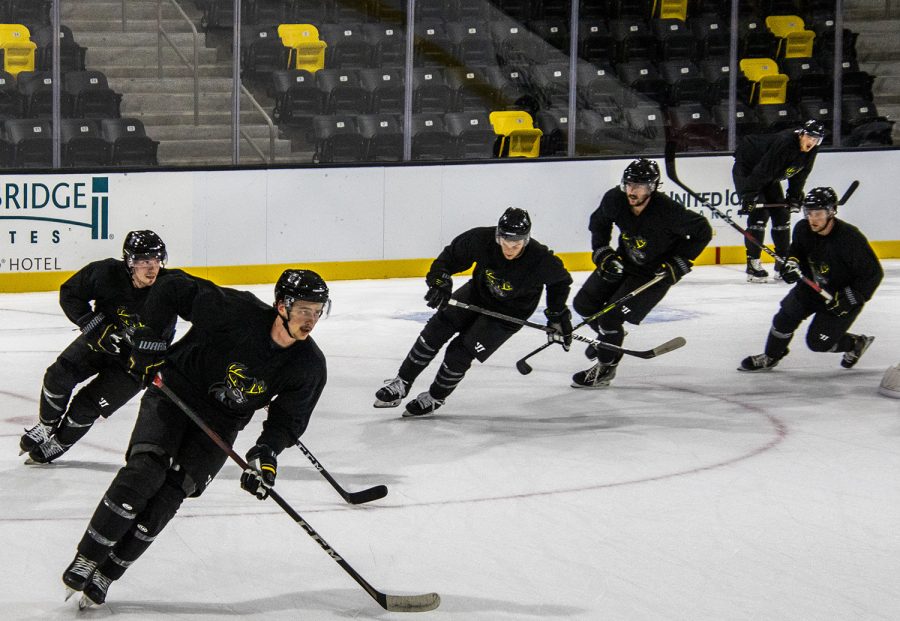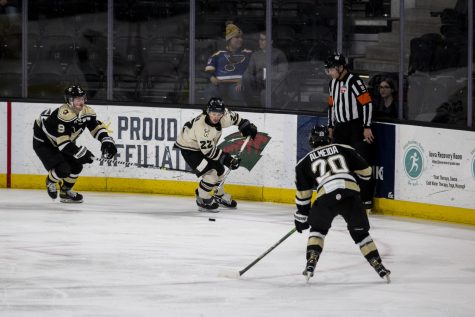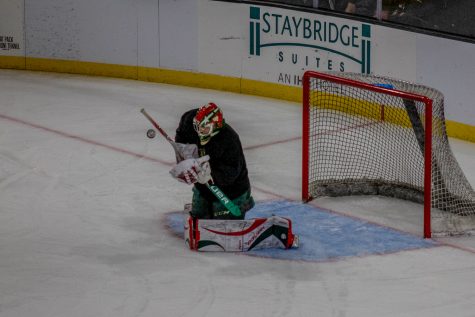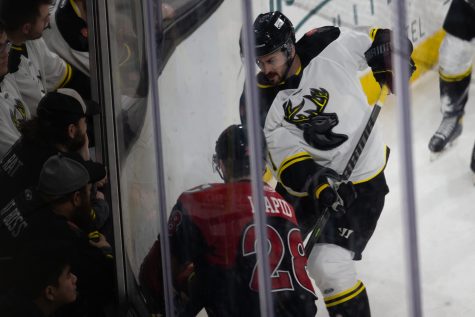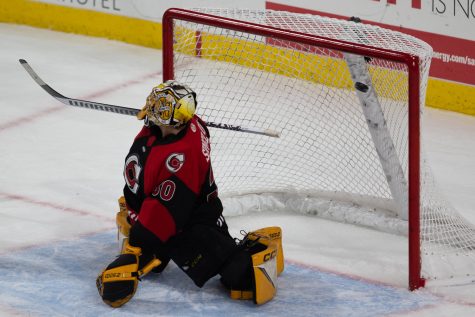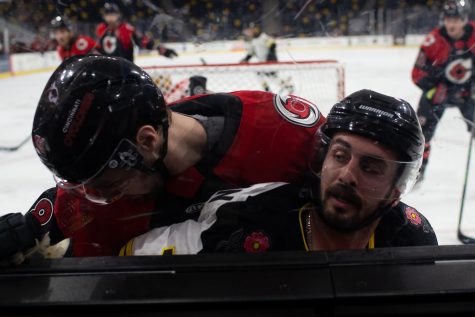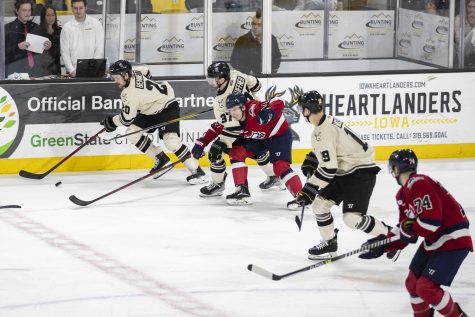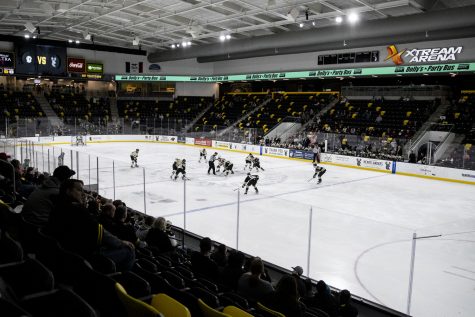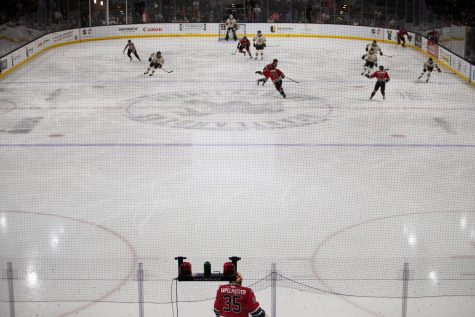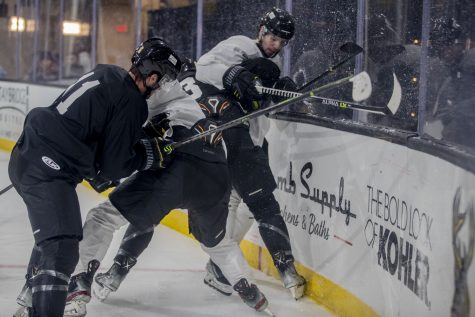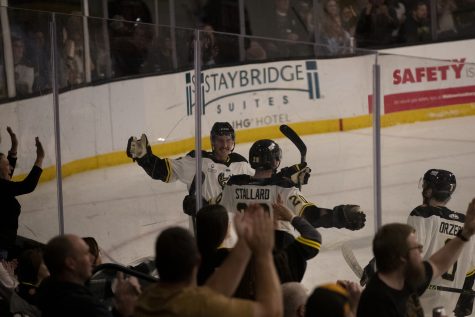How the Iowa Heartlanders’ league, the ECHL, works
Coralville’s new pro hockey team, the Iowa Heartlanders, is a member of the ECHL, which serves as the “AA” affiliate of the NHL.
Players move around the arena during the Heartlanders first practice on Monday, Oct. 11, 2021. (Jeff Sigmund/The Daily Iowan)
October 21, 2021
The Iowa Heartlanders will start their inaugural season on Friday at Xtream Arena — marking the first time a professional hockey team will host its home games in Coralville.
The club is a member of the ECHL, affiliating with the NHL’s Minnesota Wild and the AHL’s Iowa Wild.
With professional hockey new to the Iowa City area, The Daily Iowan has provided information on the ECHL, the league’s rules, and the 2021-22 season.
What is the ECHL?
The ECHL was founded in 1988 as the East Coast Hockey League.
Originally, the ECHL housed five teams on the east coast, but has expanded to 27 clubs across the country ahead of its 34th season.
The league rebranded to just its acronym, ECHL, in 2003, to reflect its nationwide presence.
The Iowa Heartlanders joined the ECHL in 2021, along with the Trois-Rivières Lions in Quebec, Canada.
RELATED: Iowa Heartlanders prepped for inaugural game
The ECHL serves as the “AA” affiliate of the NHL, with all its teams affiliated with an NHL organization. The AHL, the “AAA” affiliate of the NHL, is the league above the ECHL.
Organizations in the league stretch all the way from Boise, Idaho, to St. John’s, Newfoundland, and Labrador, Canada.
Since its inception, 701 players that have competed in the league have reached the NHL. During the last NHL season, 20 former ECHL players made their NHL debuts.
The 2021 Stanley Cup Champions, the Tampa Bay Lightning, had one ex-ECHL player on their roster — forward Yanni Gourde — marking the 21st consecutive time an ECHL representative was on a Stanley Cup champion franchise.
How the 2021-22 season will work
All teams are scheduled to compete in a 72-game regular season. Trois-Rivières and the Newfoundland Growlers opened the season Thursday night, and the regular season will end on April 17, 2022. The Heartlanders will play 36 home games at Xtream Arena over that span.
The league is split up into two conferences — Western and Eastern — with each having two divisions. The Heartlanders are in the Central division of the Western Conference, which includes the Cincinnati Cyclones, Fort Wayne Komets, Indy Fuel, Kalamazoo Wings, Toledo Walleye, and the Wheeling Nailers.
The Komets won the league championship last season.
A team will earn two points in the standings if it wins, and one point if it loses in overtime.
The top four teams in each division qualify for the Kelly Cup Playoffs. All series in the playoffs are best-of-seven.
Clubs finalized their season-opening rosters on Wednesday, which could have up to 21 players. That maximum number will dwindle down to 20 after 30 days. The Heartlanders will have to cut their roster on Nov. 21.
For each game, clubs can dress a maximum of 18 players — with two goaltenders required on the lineup card.
Organizations have a weekly salary cap of $14,400 for the first 30 days of the regular season and then $13,900 for the rest of the season. The salary floor is $10,600.
The 2022 Warrior/ECHL All-Star Classic is scheduled for Jan. 17 in Jacksonville, Florida, with the All-Star Break from Jan. 18- Jan. 20.
Teams will wear dark jerseys at home and white jerseys on the road until the All-Star Break. After the break, teams will reverse the jersey colors and wear them through the playoffs.
In the ECHL, the goal posts are blue instead of the traditional red.
The rules of play
The rules among all three leagues are similar, but the ECHL has unique overtime rules.
If a game is tied after three periods, an overtime period of seven minutes will occur, with each team providing three skaters on the ice. The first team to score wins the match.
If the team forfeiting the goal pulled its goaltender, it will lose the point it received in the standings for making it to overtime.
A shootout will occur if the game is tied after the overtime period. Video review is available for certain plays at the referee’s discretion.



